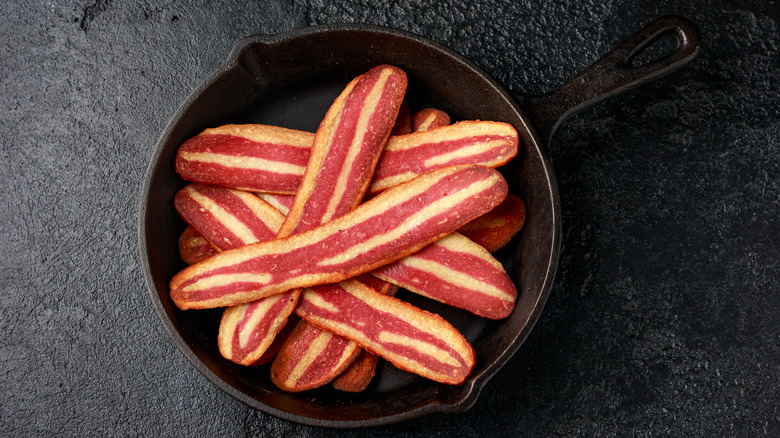What Happened To Umaro Foods From Shark Tank?
If Umaro Foods has its way, seaweed bacon will replace pork bacon during your Sunday brunch or the next time you crave a BLT. The brand felt confident enough to pitch on "Shark Tank" Season 13, Episode 18, and asked for $500,000 in exchange for 2% equity for a product that, at the time, wasn't on the market.
63% of Americans said they're cutting down on eating red meat, according to Yale's School of the Environment, and are primarily motivated by personal health and environment-related concerns. Umaro Foods co-founders Beth Zotter and Amanda Stiles have scientific backgrounds in renewable energy and molecular biology and are driven by their interest in sustainability. Before "Shark Tank," the U.S. Department of Energy awarded Umaro Foods $5 million to develop mass-scale seaweed farming in 2018. But when it comes to impressing the Sharks, Zotter said, "None of that really matters unless it tastes good."
Ultimately, Mark Cuban's offer of $1 million for a 7% equity share was chosen as the winning bid. Umaro Foods sells its seaweed-based bacon wholesale and to dozens of restaurants throughout the United States, according to its website. In addition to the company's specialized protein derived from red seaweed and regular seaweed, the bacon contains other plant-based ingredients, including chickpeas, coconut oil, and sunflower oil.
The future of Umaro Foods' seaweed bacon
Although seaweed may not be the obvious choice when you think of bacon, both have a distinctive umami taste. According to NPR, Japanese chemist Dr. Kikunae Ikeda conducted research with seaweed, eventually pioneering the idea that led to umami becoming accepted as a distinct taste in addition to sweet, salty, sour, and bitter. This is one reason Umaro Foods started with bacon. Co-founder Beth Zotter told Bakar BioEnginuity Hub at the University of California, Berkeley, "Bacon turned out to be a great fit with the ingredients we are creating." Zotter also mentioned the color, gel compounds, and umami flavor as factors, noting it's "delicious and hard to differentiate from the real thing."
Fast Company reported that Umaro partnered with Oregon State University's food innovation lab to develop the product recipe and refine the texture. Since Amanda Stiles previously worked with plant-based milk brand Ripple, known for its pea milk, she told Fast Company she is optimistic about the future of Umaro given the interest in other plant-protein products like Beyond Meat and Impossible Foods. Zotter and Stiles told Fast Company they plan to expand to retail sales sometime in 2023. Umaro Foods previously made our list of the most successful vegan food brands that successfully pitched the Sharks.

